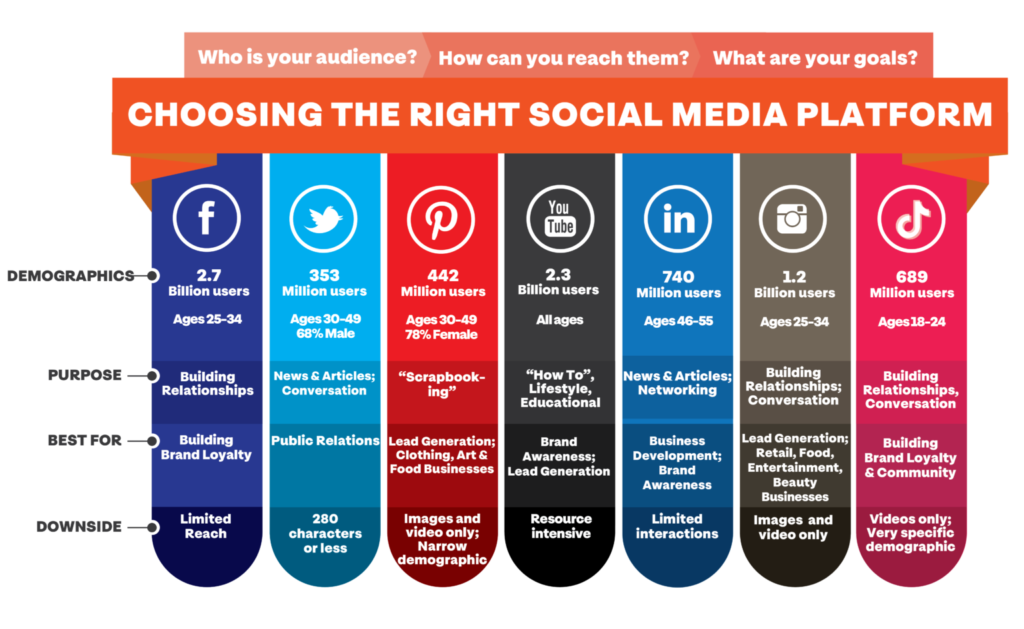It’s no secret that digital marketing is an integral part of any organization, and churches are no exception. The people you want to invite to church, reach with the Gospel, or keep informed are online, just like everyone else.
4.95 billion people worldwide use the internet in January 2022 – equivalent to 62.5 percent of the world’s total population. dataportal.com
Those numbers are staggering, and in case you are one of the few church leaders who are still wondering if digital marketing for churches is necessary, let this stat alone sober you up.
If the people you want to reach are online, you need to meet them there.
Marketing has always been about connecting with your audience in the right place and time. Today, you need to meet them where they are already spending time: on the internet. – hubspot.com
I get it, the words church and marketing kind of feel weird to say together in the same sentence, but that is only because the meaning and purpose of marketing can sometimes be misrepresented. Marketing, simply put, is the effort of promoting a viable solution for a problem.
Digital marketing for churches is the content you make available online to attract, engage, and help those you want to reach. That doesn’t sound so bad, does it?
I believe churches can use digital marketing can add tremendous value to those who have questions about God, what it’s like to be a part of a church, and if Christians are genuine.
Digital marketing can be a powerful way for churches to capture their audience’s attention and provide quality content to help them take their first or next steps with your community.
Keep reading to discover why digital marketing is important to churches, how to do it successfully, and what strategies you can use to reach more people online.

Why Should Churches Use Digital Marketing?
Churches need to use digital marketing strategies because most people they want to reach are online. Digital marketing for churches today is like sending mailers in the early 2000s or going door to door in the 90s. The internet has changed how people interact with information – today, people expect to receive communication online.
The internet continues to transform how we connect with others, organize the flow of things, and share information worldwide. With its growing influence on individual consumers and large economies alike, the internet has become an increasingly vital part of our day-to-day lives. – statista.com
When churches refuse or ignore the effectiveness of digital marketing, it’s like pretending the internet doesn’t exist.
Digital marketing is an effective way for churches to connect with the world around them and show people what they have to offer, how they can help, and why engaging with them is worth someone’s time.
The bottom line is that today, the typical first-time guest to your church is coming at the end of a long process. It may be their first time through the physical front door, but the actual front door of the church – the first one they entered – was digital. – churchandculture.org
Think about your behaviors; when you want to learn about a celebrity, an organization, a sports star, a sales offer, etc., where is the first place you go? You google, browse their website, search social platforms, and obviously, this is all online.
Church leaders are no different; they visit the church online when they want to learn about what other churches are doing, preaching, or creating. People in your community are the same; they probably visited your online platforms first if they attend in-person.
Churches are nonprofit organizations that exist to build the kingdom of God; as a result, many assume that they do not need to worry about marketing. However, this couldn’t be further from the truth.
If Jesus hung out with suspicious people in their homes, spent time in religious temples, and had a conversation with the Samaritan woman at the well, I believe He would show up online too.
Digital marketing is crucial because it meets people where they are, grows awareness, and, when done right – provides extreme value. Below are four benefits of implementing a digital marketing strategy for your church.

4 Reasons Churches Should Use Digital Marketing
1. Digital Marketing For Churches Helps Them Target Who They Want To Reach
Digital marketing strategies can help churches target people in their community or online. You can create content relevant to people’s questions, needs, or problems using organic or paid methods.
2. Churches Can Use Digital Content To Help Their Audience
There is an old saying, shared in plenty of sermons, “People don’t care what you know until they know that you care.” Churches can demonstrate that they care by providing helpful content online to share with their community.
3. A Digital Marketing Strategy Can Guide People To Take Next Steps With Your Church
I don’t know a pastor or ministry leader that doesn’t want people to come to their church. The thing is, rarely do people randomly show up. While word of mouth and a personal invitation are still kings when inviting people to church, digital engagement indicates that people are interested in your church.
Being present online with relevant content and clear, actionable next steps, your church can begin to journey with people in their walk with God and your community.
4. Digital Marketing Has A Low-Cost Barrier To Getting Started
You may think of paid ads when you think of digital marketing; while this is one aspect, it is not the only effective method. There are numerous ways for churches to show up online besides paid advertising.
Most of these strategies won’t even cost anything to start with, such as SEO, social media, and content marketing. – simplilearn.com
You may have staff to designate toward creating digital content; if not, plenty of churches use volunteers. With videos, social posts, blog articles, and even email, churches can reach people in their community or even all over the world.
Digital Marketing Strategy Tips For Churches
If your church is new to digital marketing, it can be tough to know where to start. For your marketing strategies to be effective, you need a plan. Understanding the basics of online marketing can help your church be more influential online.
Below are five essential digital marketing tactics for churches to start showing up online confidently. Churches must clarify why they want to use digital marketing, how they will measure its effectiveness, and the resources it needs.

5 Necessary Steps For Churches To Start Using Digital Marketing
1. Digital Marketing Starts With Defining Your Goals
Before you or your team does anything, you need to discuss and define your goals. What do you want to achieve with your digital marketing efforts?
- Do you want to increase first-time in-person attendance?
- Raise awareness of your church’s mission or vision?
- Increase participation with your online service?
- Invite to an upcoming event?
- Share the Gospel?
- Boost volunteer engagement?
As you can see, the purpose of digital marketing for churches can be very versatile. However, the key is defining its purpose so that you can create relevant content and measure its effectiveness.
The first step to a successful marketing initiative is knowing your goals. By defining where you want to go, you can develop a digital marketing strategy that gets you there. – arcstone.com
Once you know what you’re aiming for, it’ll be easier to tailor your plan accordingly. However, it’s crucial to ensure your goals are S.M.A.R.T:
- Specific
- Measurable
- Achievable
- Relevant
- Time-bound
For example, if you want to grow your congregation, a SMART goal might be “to increase the number of first-time visitors by 25% within six months starting on January 15th, 2022.” This goal is specific, measurable, achievable, relevant, and time-bound.
2. Identify The Audience You Want To Reach With Online Content
A church needs to know its target audience when creating digital marketing content.
Creating content that people engage with requires understanding who it is for and how it can help.
Who are you trying to reach with your digital marketing?
- Parents with small children, elementary-age, teenagers?
- Young adults?
- Married couples?
- Single people?
- Seniors?
- People with religious affiliations or none?
- Men?
- Women?
- Divorced?
- A specific city or county?
The beauty and beast of digital marketing for churches is that you can share content that is uniquely relevant for niche groups of people. Identifying a target audience makes it easier to craft content and messaging that resonates with them.
3. Clarify And Refine Your Messaging
When a church defines its goals and identifies a target audience for its digital content, it simplifies creating compelling messaging. Jesus did this all the time. Jesus was always acutely aware of who he was communicating with and the words that would impact them the most.
The best messaging highlights a problem relevant to its audience, agitates why the problem is painful, and provides a helpful step or solution to alleviate the issue.
The messaging for each piece of digital marketing content churches create is the main idea that they want people to understand, engage with, and take action to resolve.
For example, if you want to increase the number of first-time visitors to your church, the messaging could be, Visiting a church is scary, not knowing what to expect is intimidating. Click here to Take The Mystery Out Of Attending A Church. Get 4 Questions To Answer About A Church Before You Decide To Attend.
By speaking to your audience’s problem, you can convey that you are aware of, care about, and have ways to help resolve their issue. Clear messaging will help spark engagement with those you want to reach.
4. Decide Which Digital Platforms To You Will Use
Even though there are numerous platforms, that doesn’t mean you have to be on all of them. For churches deciding which digital media to use, it is essential to factor in their purpose and target audience. Using these metrics will help determine which platform is best.

source: aofund.org
Assessing the purpose of each platform and where your audience spends the most time can help you decide one or two platforms to begin using. However, the most important platforms for churches to prioritize creating digital marketing content for are the ones they own.
The #1 thing you should do if you’re growing your online influence as a church is to establish and grow your owned space.
Owned space is any space you control that isn’t subject to algorithms and the whims of other people.
The best examples of owned space include your email list, SMS messaging list, website, podcast, and even an app you build or create. Those channels are the closest thing you will get on the internet to a direct link with your audience. – careynieuwhof.com
The point here is to use the platforms but don’t put all your eggs in one basket. Think of using social media to connect with your audience initially, but other channels like email, church texting apps, podcasts, and your website as ongoing, direct communication with your most engaged members.
5. Analyze The Results Of Your Digital Marketing Plan
Like any other strategy, digital marketing will require monitoring and assessing the results. If your church already uses a dashboard to analyze KPIs, adding your digital marketing metrics will be helpful.
Connecting the dots between the digital marketing content you create and your goals can help determine if your online efforts are working or need adjustments.
If you know what you want to measure before you start marketing, you’ll know exactly what to look for — and how to determine success and impact — when your marketing is in play. – hubspot.com
Identifying your church’s goals, formulating a plan, and creating a schedule can help leaders decide to increase, maintain, or change resources towards their digital marketing plans.

What Type Of Digital Marketing Works Best For Churches?
Digital marketing for churches can work in various forms of content. Social media is one, but others such as optimizing your website, compelling lead magnets, email, and providing free valuable content are powerful forms of digital marketing for churches.
To start creating content, assess the talent that you have readily available.
- Is there someone on your team that likes to write or do graphic design?
- Do you know people that understand social media or have marketing experience?
- Are there individuals who have TikTok channels or know about video production?
You can determine the type of content you begin with by utilizing the giftings already on your team. Plus, understanding where there are gaps can help you build a team and invite others who have the experience where your team is lacking.
As your digital marketing team grows at your church, you will want to include people with the following skills:
9 Digital Marketing Skills Your Team Will Need To Develop
- Copywriting
- Social Media
- SEO
- Email Marketing
- Design
- Data Analysis
- Video
- Paid Advertising
- Strategy & Planning
Don’t let this list overwhelm you; get started with your skillsets and create the best content with the available resources. Below are five valuable types of digital marketing for churches that can increase engagement and help you reach your goals.
5 Effective Types Of Digital Marketing For Churches
1. Content Marketing
Content creation is a great way to provide free value to those interested in the topics related to their needs. Plus, it’s a practical first step of digital marketing for churches.
Because churches already have scheduled weekly content via sermons, one of the best places to start with digital marketing is repurposing Sunday’s message into blog articles, PDFs, podcasts, videos, or social posts.
6 Ways Churches Can Produce Valuable Content
- The Church Website
- Is building a website intimidating? It doesn’t have to be. Check out the post: 3 Best Church Website Builders Software Platforms Specifically For Churches.
- A Blog Site
- Do you need help building a blog site that people actually read? Visit the post, 10 Christian Blogging Strategies That Improve Content & Gow Traffic.)
- Video Production
- Nonprofits use video to share their story because of its ability to capture the emotion, essence, and context of a cause or need. Storytelling is the most powerful way to connect with an audience, and video is the most effective way to share stories because it is both visual and auditory. – ironhousestudios.com
- Podcasts
- InfoGraphics
- Downloadable PDF Guides
There are several ways that churches can produce new resources or re-create existing content to serve their audience consistently.
Need help with content creation or coming up with a plan? Visit my contact page for a free consultation.

2. Lead Magnets
Lead magnets are a marketing tool that incentivizes potential leads to exchange their contact information for a valuable resource. Churches can use lead magnets on their homepage or social platforms. Churches can also use them to replace traditional connect cards that request the same information but without a compelling reason to do so.
Lead magnets for churches could be a free ebook, video series, or helpful guide. The key is to offer and deliver high-value, free content in exchange for an email address or phone number.
Sound crazy? Picture this: Instead of asking people to fill out a visitor connect card to get more information about the church, imagine inviting them to provide a good email address to send them a resource like one of the following:
- 3 Questions Everyone Has About God That No One Will Talk About (But We Will)
- 3 Surprisingly Simple Steps To Creating A More Fulfilling Life
- 4 Things You Need To Know About God And Realize About Yourself
I trust you can see the difference; the first approach can come across as lazy and self-serving on behalf of the church. Using a lead magnet conveys thoughtfulness and relevance and offers a valuable exchange for contact information.
The effectiveness of digital marketing for churches becomes very measurable when using lead magnets to engage their audience.
There are several tools that churches can use to automate this process so that when someone submits their contact information, they receive the free resource right away.
3. List Building
Lead magnets, contact forms, and other ways of obtaining your members’ contact information to consistently stay in touch are powerful components of digital marketing for churches. Unfortunately, many churches underutilize their lists or only reach out when they need something.
There are two primary ways to use your contact list to inform, interact, and serve those interested in your church: email and SMS text messaging.
Despite what you hear and possibly even your own love-hate relationship with email – it is still effective for reaching your church members.
In spite of the rising popularity of social media, people still love to receive emails in their inboxes. Email isn’t dead, and email marketing remains one of the most cost-effective ways to reach consumers today. – campaignmonitor.com
Email marketing for churches can be equally effective. The key to your church using email is the content you send. Sending relevant, helpful content specific to the needs of your people will determine its effectiveness and your open rates. And, if stats are accurate, email is not going anywhere anytime soon.
*Church Texting Solutions
Like email, the information you send to SMS groups is vitally important to ensure they remain on your list and find it helpful. Church texting apps can improve your guest follow-up process, streamline communication, provide direct contact with your church family.
To learn more about the best platforms to use, visit the post: How To Use Church Texting To Engage And Assimilate More People.

4. Search Engine Optimization (SEO)
SEO is an organic way to help your church website or articles rank on search engine results pages (SERPs) for specific keywords or key phrases. Applying SEO best practices requires high-quality, helpful, optimized content for the major search engines like Google, Bing, and Yahoo to prioritize it in their rankings.
Although this may sound intimidating, there are SEO skills you can learn to help the content your church creates organically rank better locally and internationally.
Do you need help creating an SEO plan? Visit my contact page for a free consultation.
5. Social Media
Social media is the most popular type of digital marketing for churches and is an excellent place to start. With platforms like Facebook, Twitter, Youtube, Instagram, or TikTok, you can connect with your audience and provide them with shareable content to reach their friends.
Social media can give your followers or curious onlookers an idea of what your church is like and its values. This vantage is especially helpful for those interested in joining your church, as your online presence can provide context for what it would be like to be a part of your church family.
Additionally, if you decide to use paid advertising, you can get more granular targeting of those who will see your posts. Setting up ads is pretty straightforward; however, depending on the competition for similar keywords or demographics, it can become expensive and add up quickly.
It’s Not Too Late To Start
Digital marketing may not seem like a priority, but it can be invaluable for reaching new people and engaging current members. Digital marketing is more relevant and possible today than ever before. However, building your online presence solely on borrowed platforms is not wise.
Churches can employ several digital marketing tactics to stay relevant online and provide valuable content for their audience. You can sharpen your digital marketing skills and help your church reach more people online. Use the tips above to get started or hone your current digital strategies.




